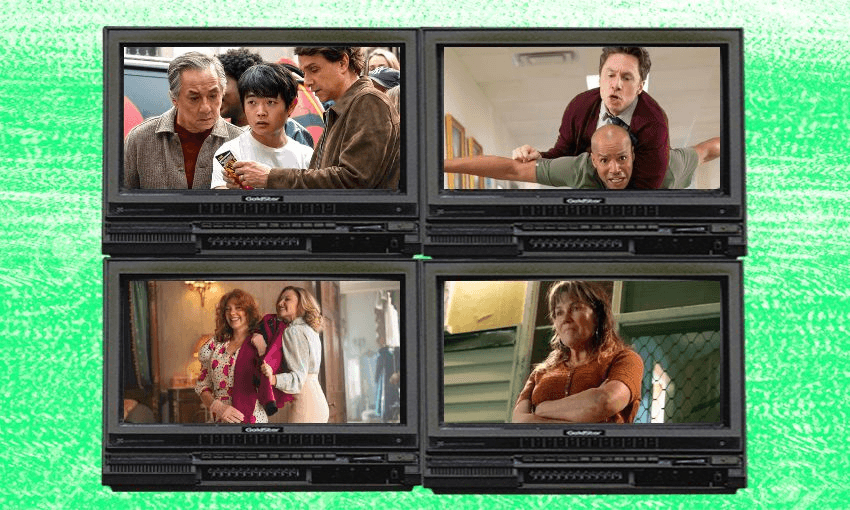Carlson has long been one of our best comedians, and now the world can see it too, writes Sam Brooks.
Last year, Urzila Carlson became the first comedian from our shores to perform her own Netflix special, a half hour episode of the Comedians of the World series. Now she’s the first New Zealander to get a full hour-long special on Netflix, fast becoming the go-to platform for international stand-up comedy.
It’s not surprising that Urzila Carlson is the first local to achieve this milestone. Her appeal has been clear from the moment she stepped onto our stages, and soon after, our screens. She didn’t look or sound like the rest of her comedy generation, aka a 7 Days panel of a decade ago: Corbett, Ego, Henwood and the rest. Being the only woman on those sorts of panels probably felt like shit, but it immediately set her apart from everybody else on the show. While the other comedians became a melange of blokes talking over each other, Carlson was the South African lesbian nailing punchline after punchline.
When the lads transgressed, it was them trying to get the laugh, to stand out. But when Carlson pushed the boundaries, it felt more tense, and the comedy hit harder. To paraphrase Hannah Gadsby in Nanette, comedy is tension. Carlson pushed against that tension, simply by being the funniest person in pretty much every room she was in. Pretty fast, she stopped being the only woman on the panel (a consistent problem on those shows) and started being the funniest person on the panel.
Her TV appeal has translated to her live shows. With every year Carlson has filled out bigger and bigger venues, delivering hours that are tighter and funnier. Her material grew to meet the space, and the broadening of her audience. She might not be as bracing or as groundbreaking as some of the generation that followed her, but nobody else can pull in audiences like she can, and keep them enthralled once they’re there. Beyond being funny, she has an undeniable presence.
She knows it, too. There’s a confidence to Carlson that radiates throughout Overqualified Loser. And you’d have to be confident to lead your special with a period joke, and chase it up with an anti-vaxxer joke, and a particularly brutal, savage anti-vaxxer joke at that. It’s a hell of a gamble, and it pays off well; it sets up boundaries that she can spend the next hour playing in, and she clearly relishes those initial minutes of pushing against audience expectations.
Carlson is a great mix-it-up comic; throughout the hour, she moves between longer stories and quicker, off-the-cuff observational bits with ease. She gets great mileage out of stories you wouldn’t expect, whether they be about how to sneak some guacamole when arriving early to a party, or the virtues of box wine (which are many and abundant, thank you very much). But she also peppers these stories with near constant punchlines, and calls to the audience; she’s involving them, and us, in her stories as co-conspirators.
There’s a power in the kind of jokes she makes. And let’s be honest: many of them are fat jokes, pure and simple. Another great comedian, Nicole Byer (who also has a half hour as part of Comedians of the World), has a bit saying that when a guy talks about being fat, it’s funny, but when a woman talks about being fat, the audience gets sad. She reclaims it in that joke, spends a fair amount of her (excellent) half hour riffing on it. The audience loves it.
Carlson performs a similar kind of reclamation in Overqualified Loser. She talks about being fat, she talks about food a lot, and she does so in a way that’s joyful, not shameful. It’s not exactly a celebration, but an acknowledgement. She looks the way she looks, and these are the jokes she tells because of it. The funniest parts of the special are when she milks a story for all it’s worth, and then gets the last, hilarious drop out of it. But the most exciting parts are where she goes a little bit dark. It’s in the anti-vaxxer joke, it’s in a joke aimed at trolls, and it’s even in some of the fat jokes.
The brilliance of Carlson is that while her comedy is joyful, it isn’t gentle. She commits one hundred percent to her jokes, physically and vocally. You get the feeling that she could go darker, but also – damn, she just wants us to have a good time watching her stand-up. That’s why she involves us in the jokes, in the stories. We leave laughing at what she’s said, not wondering what she’s revealed about the darkness of our souls. There’s a lot of comedy that does the latter, and it has its place. But sometimes, as an audience, you just want to laugh at a well-crafted joke, delivered by a confident master of the form. You want to feel that someone is explaining a situation you know so well, whether you’re an ass walking the street (a flawless bit of hers) or trying and failing to successfully devour a recently purchased sausage sizzle snag.
Carlson’s a master of the form. Audiences across New Zealand have known it for years, and turned out in droves in recognition of that. Now, it’s the world’s turn.
Urzila Carlson: Overqualified Loser is streaming on Netflix now.



